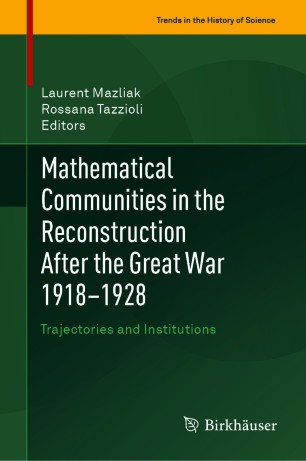Der Driburger Kreis trifft sich vom 16. bis 17. September 2021 virtuell und wird dieses Jahr gemeinsam mit den Nachwuchswissenschaftler:innen der Gesellschaft für Technikgeschichte ausgerichtet. Er richtet sich explizit an Wissenschaftler:innen, die am Anfang ihrer Karriere stehen (Studierende, Promovierende, Post-Docs, Habilitanden) der Wissenschafts-, Medizin- und Technikgeschichte und angrenzender Disziplinen. Der Driburger Kreis findet im Vorfeld der gemeinsamen Jahrestagung der Gesellschaft für die Geschichte der Wissenschaften, der Medizin und der Technik (GWMT) und der Gesellschaft für Technikgeschichte (GTG) statt, die entweder in Wien oder ebenfalls virtuell tagen wird.
Der Driburger Kreis versteht sich als informelles Forum, in dem Probleme, Schritte und Ergebnisse eigener Arbeiten vorgestellt und in einer konstruktiven Atmosphäre diskutiert werden können. Ausdrücklich erwünscht sind auch Projektvorstellungen jenseits des Rahmenthemas.
Das diesjährige Rahmenthema lautet:
Ersatz
Der Driburger Kreis wird dieses Jahr gemeinsam mit den Nachwuchswissenschaftler:innen der
Gesellschaft für Technikgeschichte das Thema Ersatz aufgreifen. Der Begriff Ersatz enthält laut dem
etymologischen Wörterbuch mindestens drei unterschiedliche Bedeutungsebenen: Ersatz ist, „‘was
als Erneuerung, Vertretung oder Wiederherstellung dient’ (18. Jh.)“ (o.D.). Diese Dimensionen des Begriffs eröffnen ein breites Spektrum an Anwendungsmöglichkeiten im Rahmen des Driburger Kreises – von Prothesen, Hormonersatztherapien und Reparaturmaßnahmen bis hin zum Austausch etablierter Materialien, Personen, Systeme oder Ideen.
Ersatz klingt zunächst nach einer Substitution, die weniger vollständig oder passend ist als der Ausgangszustand: Was ersetzt wurde, ist nun nicht mehr da, hat Schaden genommen oder ‚musste‘ entfernt werden. Etwas – seien es großtechnologische Systeme, Beziehungskonstellationen, Körperteile oder Auffassungen – wird provisorisch wiederhergestellt oder durch stetigen Ersatz am Laufen gehalten. In dieser Bedeutung klingt mehr Notdürftigkeit mit als eine vollständige, akzeptable Wiederherstellung. Beispiele hierfür sind etwa der Lebensmittelersatz, aber auch die rechtliche Dimension der Rückerstattung, Entschädigung oder Abfindung.
Ersatz als Erneuerung hat hingegen eine positive Konnotation – mit einem ungebrauchten ‚Bauteil‘ läuft ein System wieder, greift ineinander und funktioniert ‚wie es eigentlich gedacht war’. Konjunkturen des Ersetzens von Stoffen beispielsweise treten ein, sobald neue Materialien entdeckt und für zweckmäßig gehalten werden – als Beispiel können hier Kunststoffe in der Medizintechnik oder in der Kommunikationstechnik die Ablösung des Kupferkabels durch die Glasfaser dienen. Ersatz kann also als Fortschritt interpretiert werden, d.h. als technikoptimistische Konstanz der Neuentwicklung und Überarbeitung von Geräten. Auch jede politische Initiative ist immer schon Ersatz des Vorherigen und lebt von dieser Abgrenzungsbewegung. Neue Bewertungskriterien, gesellschaftliche Ziele oder Wissensgrundlagen, lösen einen Ersatz des Alten aus. Ein aktuelles Beispiel ist die Stromgewinnung: Erneuerbare Energien drängen Atom- und Kohlekraftwerke zurück. Welche Ideen werden ersetzt und welche Personen in die Position gebracht, um ein als ‚überholt‘ geltendes System zu erneuern?
Die Frage nach Ersatz ist oft eine Frage nach dem Zusammenspiel zwischen Mensch, Technologie und Ideologie. Der Austausch einzelner Körperfunktionen oder -teile der ‚Ersatzteilmedizin‘ prägte die Wahrnehmung des Menschen als Zusammenhang funktionierender Einzelteile, dem Menschen als Maschine (vgl. RABINBACH 2001). Allen voran ist hier die Prothese zu nennen, die als medizinischer Eingriff nach dem 1. Weltkrieg reüssierte. Als körperliche Anpassung an die Massenproduktion war sie gleichermaßen an Männlichkeitsideale des Versorgers und an die Erhaltung des Nationalbewusstseins gekoppelt (HARASSER 2013). Optimierungsbestrebungen, z.B. durch HighTech-Prothesen oder andere Human Enhancement- und KI-Technologien, scheinen weniger etwas Fehlendes ersetzen zu wollen als Körpergrenzen auszudehnen. KI-Technologien können auch ganze Lebensbereiche ersetzen: dies trifft etwa auf das autonome Fahren, menschenlose Cockpits oder eigenständige Serverfarmen zu. Was wird ersetzt, wer darf darüber entscheiden und welche Voraussetzungen und Konsequenzen hat der Ersetzungsprozess?
Die Entscheidung, etwas zu ersetzen, hängt auch mit der Frage nach der Lebensdauer von Dingen
zusammen. Der Ersatz von Automobilteilen in der Reparatur ist weit verbreitet. Insbesondere in der DDR wurden Artikel wie der Simson Motorroller oder der Trabbi mit der Möglichkeit ausgestattet, Teile auch mit wenig Vorwissen zu ersetzen, anstatt das vollständige Objekt auszutauschen. In der Elektrotechnik wird der Ersatz erschwert oder unmöglich gemacht. Durch verklebte Teile, Patentwissen, steigende Komplexität oder Sicherheitsvorkehrungen bleibt das Innere eines Gehäuses eine Black-Box; d.h. Herstellungsprozesse und Einzelteile des Ganzen sind unsichtbar (vgl. LATOUR 1999, S. 304). Nicht zuletzt stellen auch Institutionen- und Hierarchiegefüge eine Black Box dar, da sie von außen undurchdringlich und gegenüber niedrigschwelliger Partizipation verschlossen wirken. Einstellungskriterien für die Neubesetzung politischer Ämter, wissenschaftlicher Positionen oder in Aufsichtsräten, also Ersatz als Erneuerung, werden zunehmend hinterfragt.
Sophia Wagemann, Universität Leipzig
Abstracts von einer Seite für ca. 15-minütige Vorträge nebst Kurzlebenslauf (zusammengefasst in einem pdf) werden erbeten bis zum 1. Juli 2021. Für die Diskussion werden ca. weitere 30 Minuten zur Verfügung stehen. Vorträge außerhalb des Rahmenthemas sind ebenso willkommen.
Die Abstracts und gerne auch Fragen schickt bitte an rebecca.mossop@uni.lu und a.m.stoger@hum.leidenuniv.nl
Organisiert vom Driburger Kreis (vertreten durch Carola Oßmer: carola.ossmer@leuphana.de, Elena Kunadt: elena.kunadt@tu-berlin.de und Linda Richter) und der Nachwuchsvertretung der GTG (Nikolai Ingenerf: nikolai.ingenerf@rub.de und Rebecca Mossop: rebecca.mossop@uni.lu)
Literatur:
DIGITALES WÖRTERBUCH DER DEUTSCHEN SPRACHE (o. D.). Ersatz, in: Etymologisches Wörterbuch des Deutschen. https://www.dwds.de/wb/etymwb/Ersatz.
HARASSER, KARIN (2013): Sensible Prothesen. Medien der Wiederherstellung von Produktivität, in: Body Politics 1;1, S. 99-117.
RABINBACH, ANSON (1998): Ermüdung, Energie und der menschliche Motor, in: Philippe Sarasin/Jakob Tanner (Hrsg.), Physiologie und industrielle Gesellschaft. Studien zur Verwissenschaftlichung des Körpers im 19. Und 20. Jahrhundert, Frankfurt/Main, S. 286-312.









